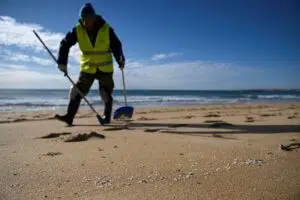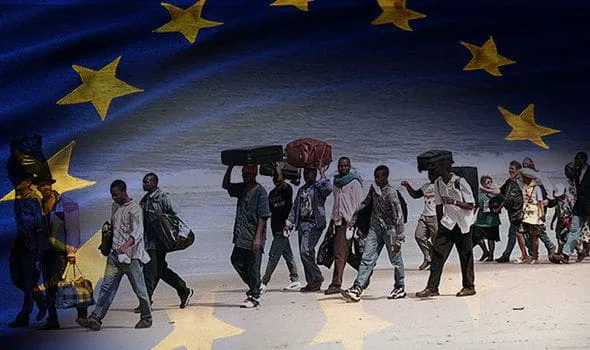Brussels – A spill of over 25 tons of plastic pellets into the sea, which washed up on the coast of northwestern Spain, raises a more serious problem for all EU countries: the impact of microplastic pollution on marine habitats and the health of European citizens. “These are occasional events, but they create a significant impact on soil, water, and people’s livelihoods,” the European Commissioner for Environment, Oceans, and Fisheries, Virginijus Sinkevičius, warns, speaking at the EU Parliament plenary debate on the recent ecological disaster off the coasts of Galicia, Asturias, Cantabria, and the Basque Country.

Pellets – tiny plastic balls usually less than five millimeters in diameter – are used as the raw material of plastic products. On December 8, six containers fell into the sea near the Portuguese coast from the Toconao container ship (operated by Danish shipping company Maersk), one of which contained over 25 thousand kilograms of pellets. While both the Danish company and the Spanish Public Prosecutor’s Office have launched investigations to determine the causes and responsibility for the accident, the ‘tide’ of microplastics that spilled into the Atlantic was carried by the current toward the Spanish coast, bringing back memories of the severe marine pollution in Galicia in 2002 after the sinking of the Prestige tanker. If 20 years ago it was oil, today, concerns stem from the consequences of microplastics in the sea, partly because of limited knowledge of the effects of their uptake on human and animal health.
“Cooperation is needed from all member countries because waters know no borders,” Commissioner Sinkevičius urged, stressing that “the sea can be an unpredictable space and current climate conditions may inevitably lead to other disasters.” That is why “remedial procedures are needed to prevent marine pollution,” starting with support for the Community Executive’s recent initiative. “In October, we presented a proposal to prevent the spillage of pellets into the sea,” since prevention is needed rather than a response to ecological catastrophes: “Once they enter the environment, they are difficult to collect, and, in any case, it is an expensive procedure also in terms of time and equipment,” the head for the Environment in the von der Leyen cabinet reminded MEPs. The founding principle is that “the polluter pays”. This means that “economic operators must take actions to avoid spills and ensure the obligation to contain and clean up.”
The EU Commission’s proposal against pellets at sea
The EU Commission proposed the Regulation to prevent microplastic pollution due to the unintentional release of plastic pellets on October 16, 2023, aiming to combat an ecological problem that sees between 52 and 184 thousand tons released into the environment each year due to shortfalls along the supply chain. “The proposal covers all European and non-European operators who store, transport to Europe, and convert pellets into products,” Commissioner Sinkevičius said, thanking the Parliament for “prioritizing” the issue despite the busy schedule of the last few months of the legislature: “Pellets are one of the biggest sources of unintentional microplastic pollution.”
The proposal now being considered by the co-legislators stipulates that, depending on the size of the facility or transport activity, operators will have to adhere to certain best management practices defined by the EU Commission and “already implemented by major operators.” In addition, larger operators will need a mandatory certification issued by an independent third party. Smaller companies will have to make self-declarations of conformity to help national competent authorities verify compliance. Standardization bodies will be required to develop a harmonized methodology to increase accountability and awareness of the impact of different practices on the environment and human health to monitor leakage and address remaining data gaps. Finally, since the pellet supply chain mainly comprises small and medium-sized enterprises there are “lighter” requirements for micro and small operators.
English version by the Translation Service of Withub





